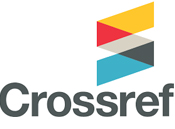Application of Problem-Based Learning Model to Improve Mathematical Problem-Solving Ability of Class VII-B Students of MTs PP Nurul Huda Lubuk Batu Jaya
Abstract
This classroom action research aims to improve the problem-solving process and students' mathematical problem-solving skills by applying the Problem Based Learning model. The subjects in this study were class VII-B students of MTs PP Nurul Huda Lubuk Batu Jaya in the even semester of the 2021/2022 school year, totaling 24 students. This study consisted of two cycles, each consisting of four stages: planning, implementation, observation, and reflection. The research instruments used were learning devices and data collection instruments. Learning tools consist of a syllabus, lesson plan (RPP), and student activity sheets (LAS), while the data collection instruments used are observation sheets and KPMM tests. Data from the observation sheet shows that the learning process has improved from cycle I to cycle II. The average KPMM score of students in the first cycle was 68.61, increasing to 86.36 in the second cycle. Based on the results obtained, it can be concluded that the Problem Based Learning model can improve the learning process and the mathematical problem-solving abilities of class VII-B MTs PP Nurul Huda Lubuk Batu Jaya students in the even semester of the 2019/2020 school year.
References
Kemendikbud, Salinan Lampiran Permendikbud No. 103 Tentang Pembelajaran Pada Pendidikan Dasar dan Pendidikan Menengah. Indonesia, 2014.
Kemdikbud, “Permendikbud Nomor 58 Tahun 2014 tentang kurikulum 2013 Sekolah Menengah Pertama / Madrasah Tsanawiyah.” 2014.
T. S. Sumartini, “Peningkatan Kemampuan Pemecahan Masalah Matematis Siswa melalui Pembelajaran Berbasis Masalah,” Mosharafa J. Pendidik. Mat., vol. 5, no. 2, pp. 148–158, 2016.
H. Kartika, “Meningkatkan KPMM dan Self-concept Calon Guru di Kabupaten Karawang Melalui Pendekatan Open-ended,” AKSIOMA J. Progr. Stud. Pendidik. Mat., vol. 6, no. 2, pp. 198–204, 2017.
R. H. Simanungkalit, “Pengembangan Perangkat Pembelajaran untuk Meningkatkan Kemampuan Pemecahan Masalah Matematis Siswa SMP Negeri 12 Pematangsiantar,” MUST J. Math. Educ. Sci. Technol., vol. 1, no. 1, pp. 39–56, 2016.
K. E. Lestari and M. R. Yudhanegara, Penelitian Pendidikan Matematika. Bandung: PT Refika Aditama, 2017.
Kemendikbud, Salinan Lampiran Permendikbud No. 22 Tentang Standar Proses Pendidikan Dasar dan Menengah. Indonesia, 2016.
Trianto, Panduan Lengkap Penelitian Tindakan Kelas (Classroom Action Research) : Teori & Praktik. Jakarta: Prestasi Pustakaraya, 2011.
M. Hosnan, Pendekatan Saintifik Dan Kontekstual Dalam Pembelajaran Abad 21. Bogor: Ghalia Indonesia, 2014.
D. J. G. dan T. Kependidikan, Modul Pengembangan Keprofesian Berkelanjutan. Jakarta: Kementerian Pendidikan dan Kebudayaan Republik Indonesia, 2017.
A. H. Yanti, “Penerapan Model problem Based Learning terhadap kemampuan Komunikasi dan KPMM Siswa SMP Lubuklinggau,” J. Pendidik. Mat. Raflesia, vol. 2, no. 2, pp. 118–129, 2017.
C. M. Samosir, T. Solfitri, and A. Armis, “Penerapan Model Pembelajaran Berdasarkan Masalah untuk Meningkatkan Kemampuan Pemecahan Masalah Matematis Siswa Kelas VII A SMP PGRI Pekanbaru Tahun Pelajaran 2019 / 2020,” Juring (Journal Res. Math. Learn., vol. 3, no. 4, pp. 403–412, 2020.
R. N. Friantini, R. Winata, and J. I. Permata, “Pengembangan Modul Kontekstual Aritmatika Sosial Kelas 7 SMP,” J. Cendekia J. Pendidik. Mat., vol. 4, no. 2, pp. 562–576, 2020.
S. Arikunto, Suhardjono, and Supardi, Penelitian Tindakan Kelas. Jakarta: Bumi Aksara, 2016.
W. Sanjaya, Penelitian Tindakan Kelas. Jakarta: Prenada Media, 2011.
G. Gunantara, I. M. Suarjana, and P. N. Riastini, “Penerapan Model Pembelajaran Problem Based Learning Untuk Meningkatkan Kemampuan Pemecahan Masalah Matematika Siswa Kelas V,” Mimb. PGSD Undiksha, vol. 2, no. 1, 2014.
I. Fitriani, “Peranan Model Problem Based Learning Terhadap Kemampuan Pemecahan Masalah Matematis Peserta Didik Kelas VII SMP,” J. Pendidik. Tambusai, vol. 2, no. 2, pp. 841–846, 2018.
Copyright (c) 2022 Journal of Research on Mathematics Instruction (JRMI)

This work is licensed under a Creative Commons Attribution-NonCommercial-ShareAlike 4.0 International License.






